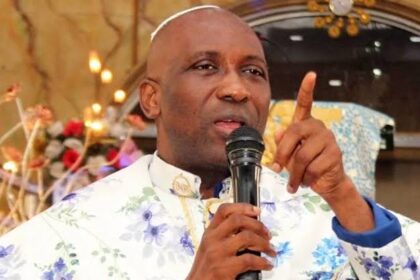By Temitope Olofinjana
At the intersection between life and livelihood, former billionaire businessman, Festus Fadeyi, is cliffhanging dangerously. Until recently, Fadeyi was the self-effacing but life-loving chairman of Pan Ocean Corporation, an indigenous independent oil and gas company. Though not very popular in social circles.
Until recently he was the swashbuckling, deep-pocket boss of Pan Ocean. Yes, he was the cock of the walk, the ruler of the roost and the major domo in the pantheon of deep pockets. He commanded the attention and adulation of men and women wherever he went or his name was mentioned even for just the effect; not just on account of his well-fed frame but because of his generousity to men and women who crossed his path.
Fadeyi was loaded to the hilt too with choice properties across highbrow areas of Lagos and all over the world.
The bubble, however, burst for him when the Assets Management Corporation of Nigeria, AMCON, took over his Pan Ocean Corporation’s assets and those of its subsidiaries over bank loans totalling about N240billion. Even his main house, office complex and other properties were confiscated stripping him bare as it were.
Having lost his livelihood, literally, a new battle has erupted in the life of the beleaguered oil and gas mogul. Perhaps one of the longest-running battles in Nigeria’s oil and gas sector, Fadeyi’s Panocean was the only junior to have a joint venture with the NNPC of the sort that the majors had. Panocean was the operator of Oil Mining Lease (OML) 98, a joint venture between it and the federal government, through the Nigerian National Petroleum Corporation, NNPC.
Interocean Oil Development Co and Interocean Oil Exploration Co. founded by the late Vittorio Fabbri reportedly had a stake in Panocean, the Italian family maintains. However, the family’s patriarch, Fabbri, died in 1998. His family insist that the Interocean entities are the beneficial owners of the 40 per cent stake in OML 98, while the NNPC owns the remaining 60 per cent. But that their Nigerian associates, led by Panocean’s Fadeyi, reportedly used the company’s debt to the NNPC, to justify taking over their investment. The move, allegedly approved by a government keen to recover its loan, angered the Fabbris who then began acrimonious negotiations to recover their shares.
In 2013, having failed to wrest back control of the company, the Italian family initiated arbitration proceedings against the NNPC and the federal government, accusing them of complicity in the affair.
In June 2020, the World Bank’s International Centre for Settlement of Investment Disputes (ICSID), to which the Fabbris submitted the case in September 2013, received formal observations from both parties on their adversary’s statement of costs, the last documents needed before a ruling is issued. The ICSID, which Nigeria is a signatory to, was set up to facilitate the resolution of disputes between investors and the signatory countries to the ICSID Convention.
Now, the saga is finally coming to an end at a time when PanOcean has fallen from grace in Nigeria and at a time when several cases against its current shareholders are keeping courts in the UK, Switzerland, and Nigeria busy. The Fabbri family, which believes it had been robbed by federal authorities and the NNPC of its rights to Panocean, is seeing light at the end of the dark tunnel with the intervention of the ICSID while Fadeyi is seeing deeper gloom.



